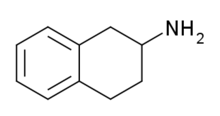2-Aminotetralin
2-Aminotetralin (2-AT), also known as 1,2,3,4-tetrahydronaphthalen-2-amine (THN), is a stimulant drug with a chemical structure consisting of a tetralin group combined with an amine.[1][2]
 | |
| Clinical data | |
|---|---|
| Routes of administration | Oral |
| ATC code |
|
| Legal status | |
| Legal status |
|
| Identifiers | |
| |
| CAS Number | |
| PubChem CID | |
| ChemSpider | |
| ChEMBL | |
| ECHA InfoCard | 100.019.067 |
| Chemical and physical data | |
| Formula | C10H13N |
| Molar mass | 147.221 g·mol−1 |
| 3D model (JSmol) | |
| |
| |
| | |
2-AT is a rigid analogue of phenylisobutylamine and fully substitutes for d-amphetamine in rat discrimination tests, although at one eighth the potency.[1] It has been shown to inhibit the reuptake of serotonin and norepinephrine, and likely induces their release as well.[3][4] It is also likely to act on dopamine on account of its full substitution of d-amphetamine in rodent studies.[1]
Chemical derivatives
A number of derivatives of 2-aminotetralin exist, including:
- 5-OH-DPAT
- 6-CAT
- 6-OH-DPAT
- 7-OH-DPAT
- 7-OH-PIPAT
- 8-OH-DPAT
- AS-19
- DP-5,6-ADTN
- Lometraline
- MDAT
- MDMAT
- N-0434
- RDS-127
- Sertraline
- SR-59,230-A
- Tametraline
- UH-232
gollark: Apparently Zen 2 is using *two* branch prediction things.
gollark: It's still quite cool.
gollark: And they break down the instructions into smaller instructions, and I think somehow execute several of those at the same time on one core.
gollark: And they somehow have billions of transistors switching billions of times a second using less power than an old inefficient lightbulb.
gollark: They're working on scales barely above individual atoms, and yet somehow reliably and cheaply enough that you can (well, will be able to around today) buy stuff made this way for £200 or so.
See also
References
- Oberlender R, Nichols DE (March 1991). "Structural variation and (+)-amphetamine-like discriminative stimulus properties". Pharmacology, Biochemistry, and Behavior. 38 (3): 581–6. doi:10.1016/0091-3057(91)90017-V. PMID 2068194. S2CID 19069907.
- Marley E, Stephenson JD (August 1971). "Actions of dexamphetamine and amphetamine-like amines in chickens with brain transections". British Journal of Pharmacology. 42 (4): 522–42. doi:10.1111/j.1476-5381.1971.tb07138.x. PMC 1665761. PMID 5116035.
- Bruinvels J (June 1971). "Evidence for inhibition of the reuptake of 5-hydroxytryptamine and noradrenaline by tetrahydronaphthylamine in rat brain". British Journal of Pharmacology. 42 (2): 281–6. doi:10.1111/j.1476-5381.1971.tb07109.x. PMC 1667157. PMID 5091160.
- Bruinvels J, Kemper GC (September 1971). "Role of noradrenaline and 5-hydroxytryptamine in tetrahydronaphthylamine-induced temperature changes in the rat". British Journal of Pharmacology. 43 (1): 1–9. doi:10.1111/j.1476-5381.1971.tb07151.x. PMC 1665934. PMID 4257629.
This article is issued from Wikipedia. The text is licensed under Creative Commons - Attribution - Sharealike. Additional terms may apply for the media files.